Psychological Impact of Prolonged Detention on Refugees in Australia
VerifiedAdded on 2023/06/08
|6
|1457
|467
Essay
AI Summary
This essay investigates the psychological effects of prolonged detention on refugees in Australia, focusing on the mental health consequences of this practice. It highlights the increased rates of anxiety, depression, and suicidal tendencies among detainees, as well as the specific impact on children, including developmental delays and post-traumatic stress disorder. The essay explores various reasons behind these psychological effects, such as loss of freedom, social isolation, abuse of power by authorities, and the poor conditions within detention centers. It also critically analyzes the impact of these factors, citing statistics on increased suicidal behaviors and the re-traumatization of previously imprisoned or tortured individuals. The essay concludes by emphasizing the need for policies that prioritize the mental well-being of refugees, particularly children, and minimize the adverse psychological effects associated with prolonged detention.
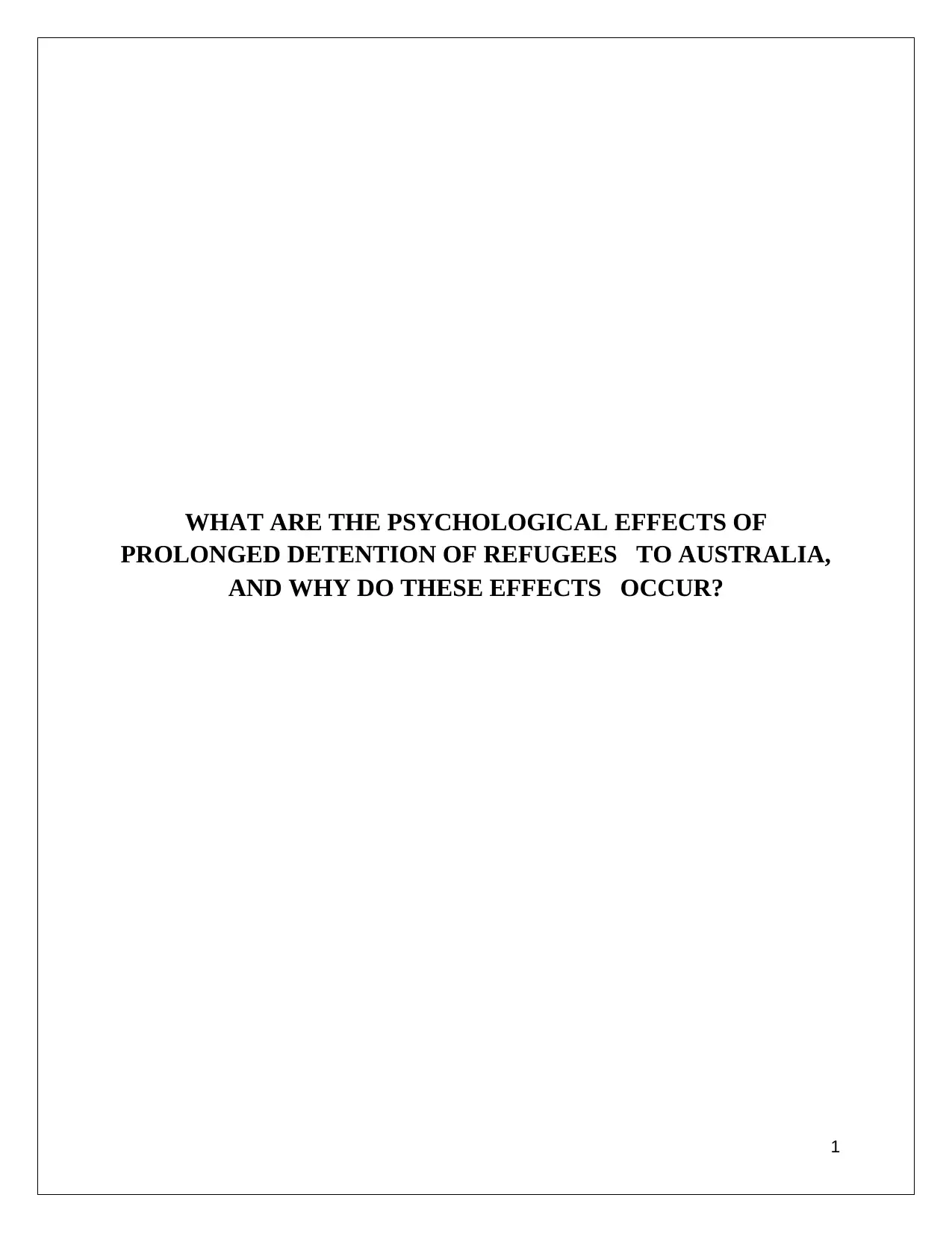
WHAT ARE THE PSYCHOLOGICAL EFFECTS OF
PROLONGED DETENTION OF REFUGEES TO AUSTRALIA,
AND WHY DO THESE EFFECTS OCCUR?
1
PROLONGED DETENTION OF REFUGEES TO AUSTRALIA,
AND WHY DO THESE EFFECTS OCCUR?
1
Paraphrase This Document
Need a fresh take? Get an instant paraphrase of this document with our AI Paraphraser
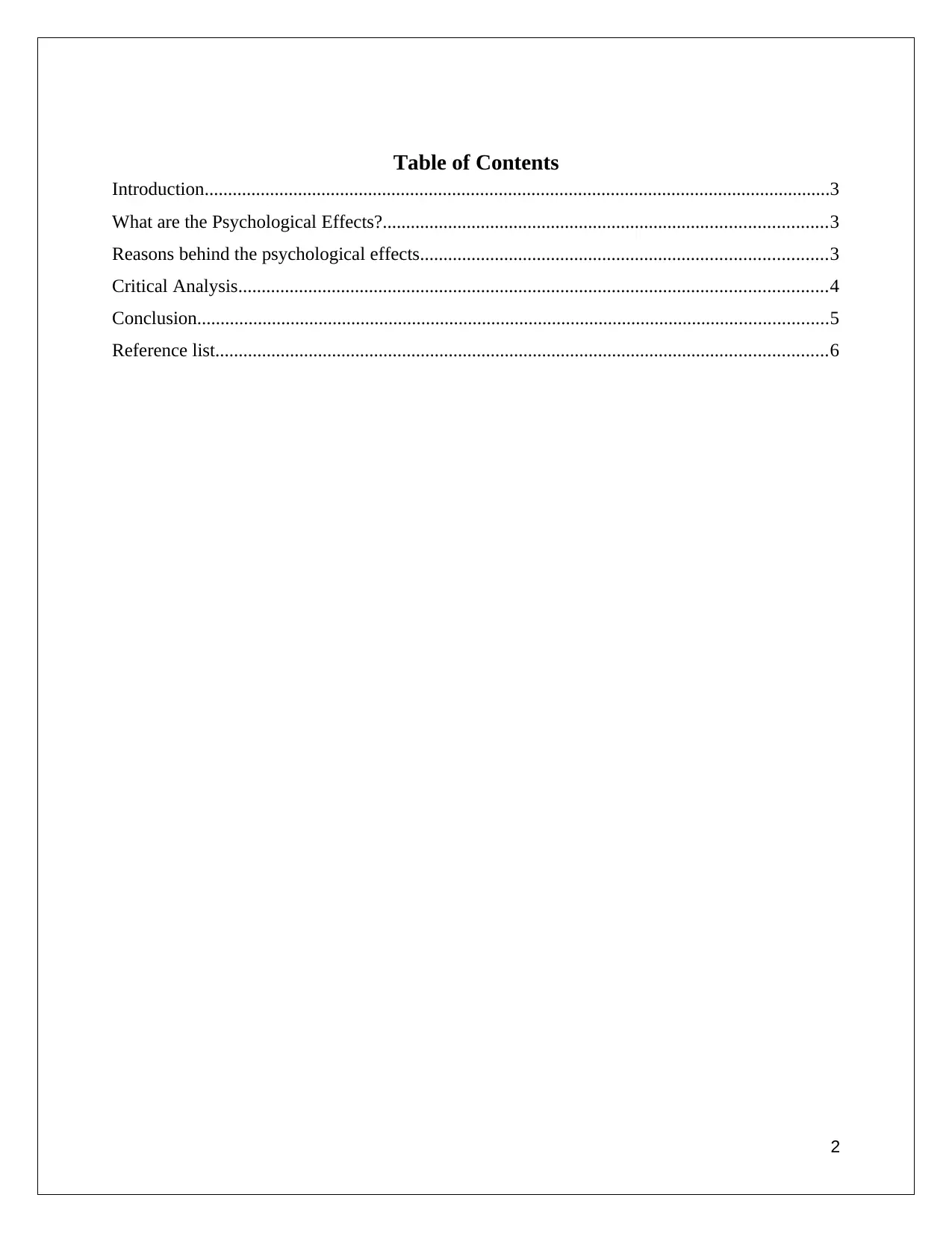
Table of Contents
Introduction......................................................................................................................................3
What are the Psychological Effects?...............................................................................................3
Reasons behind the psychological effects.......................................................................................3
Critical Analysis..............................................................................................................................4
Conclusion.......................................................................................................................................5
Reference list...................................................................................................................................6
2
Introduction......................................................................................................................................3
What are the Psychological Effects?...............................................................................................3
Reasons behind the psychological effects.......................................................................................3
Critical Analysis..............................................................................................................................4
Conclusion.......................................................................................................................................5
Reference list...................................................................................................................................6
2
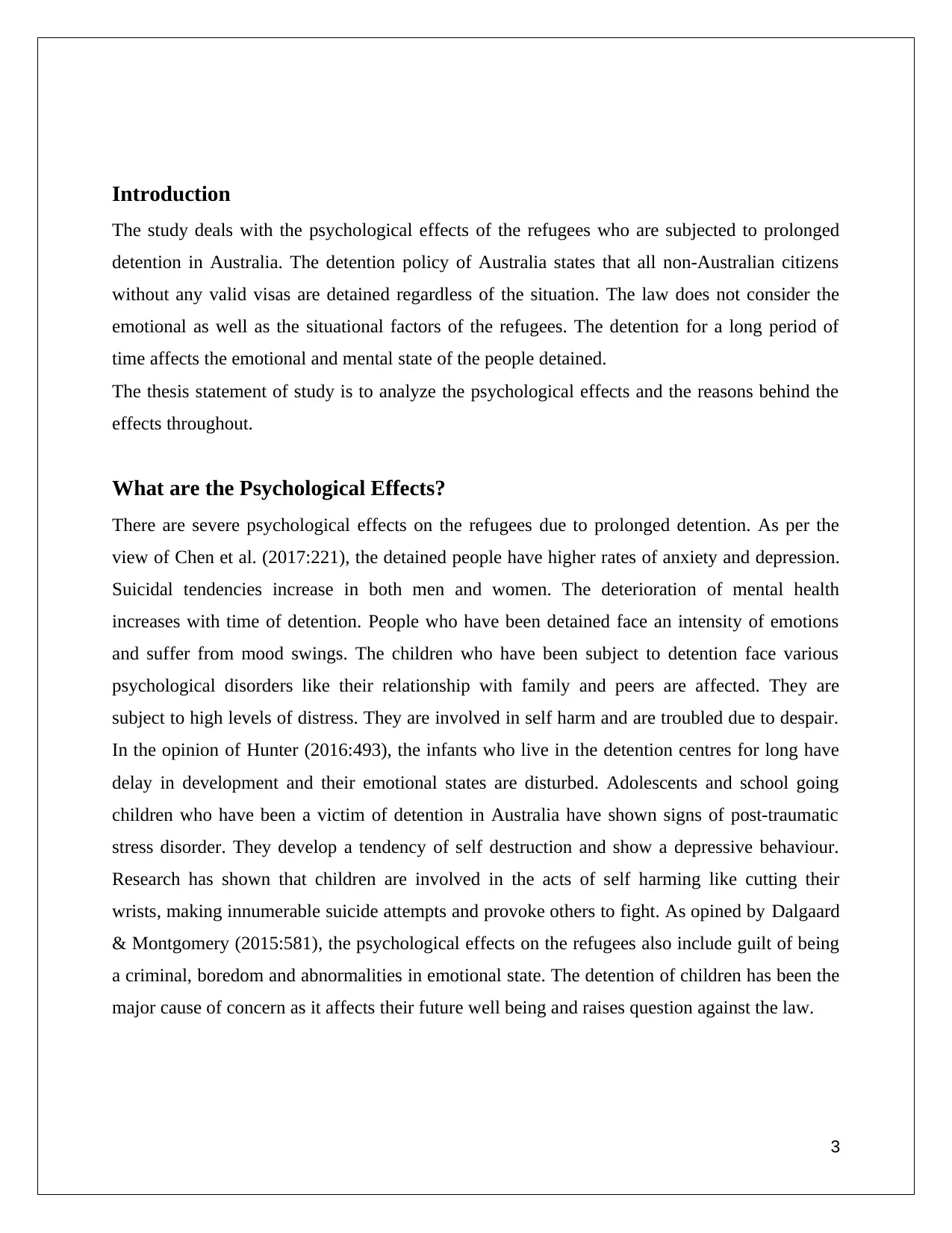
Introduction
The study deals with the psychological effects of the refugees who are subjected to prolonged
detention in Australia. The detention policy of Australia states that all non-Australian citizens
without any valid visas are detained regardless of the situation. The law does not consider the
emotional as well as the situational factors of the refugees. The detention for a long period of
time affects the emotional and mental state of the people detained.
The thesis statement of study is to analyze the psychological effects and the reasons behind the
effects throughout.
What are the Psychological Effects?
There are severe psychological effects on the refugees due to prolonged detention. As per the
view of Chen et al. (2017:221), the detained people have higher rates of anxiety and depression.
Suicidal tendencies increase in both men and women. The deterioration of mental health
increases with time of detention. People who have been detained face an intensity of emotions
and suffer from mood swings. The children who have been subject to detention face various
psychological disorders like their relationship with family and peers are affected. They are
subject to high levels of distress. They are involved in self harm and are troubled due to despair.
In the opinion of Hunter (2016:493), the infants who live in the detention centres for long have
delay in development and their emotional states are disturbed. Adolescents and school going
children who have been a victim of detention in Australia have shown signs of post-traumatic
stress disorder. They develop a tendency of self destruction and show a depressive behaviour.
Research has shown that children are involved in the acts of self harming like cutting their
wrists, making innumerable suicide attempts and provoke others to fight. As opined by Dalgaard
& Montgomery (2015:581), the psychological effects on the refugees also include guilt of being
a criminal, boredom and abnormalities in emotional state. The detention of children has been the
major cause of concern as it affects their future well being and raises question against the law.
3
The study deals with the psychological effects of the refugees who are subjected to prolonged
detention in Australia. The detention policy of Australia states that all non-Australian citizens
without any valid visas are detained regardless of the situation. The law does not consider the
emotional as well as the situational factors of the refugees. The detention for a long period of
time affects the emotional and mental state of the people detained.
The thesis statement of study is to analyze the psychological effects and the reasons behind the
effects throughout.
What are the Psychological Effects?
There are severe psychological effects on the refugees due to prolonged detention. As per the
view of Chen et al. (2017:221), the detained people have higher rates of anxiety and depression.
Suicidal tendencies increase in both men and women. The deterioration of mental health
increases with time of detention. People who have been detained face an intensity of emotions
and suffer from mood swings. The children who have been subject to detention face various
psychological disorders like their relationship with family and peers are affected. They are
subject to high levels of distress. They are involved in self harm and are troubled due to despair.
In the opinion of Hunter (2016:493), the infants who live in the detention centres for long have
delay in development and their emotional states are disturbed. Adolescents and school going
children who have been a victim of detention in Australia have shown signs of post-traumatic
stress disorder. They develop a tendency of self destruction and show a depressive behaviour.
Research has shown that children are involved in the acts of self harming like cutting their
wrists, making innumerable suicide attempts and provoke others to fight. As opined by Dalgaard
& Montgomery (2015:581), the psychological effects on the refugees also include guilt of being
a criminal, boredom and abnormalities in emotional state. The detention of children has been the
major cause of concern as it affects their future well being and raises question against the law.
3
⊘ This is a preview!⊘
Do you want full access?
Subscribe today to unlock all pages.

Trusted by 1+ million students worldwide
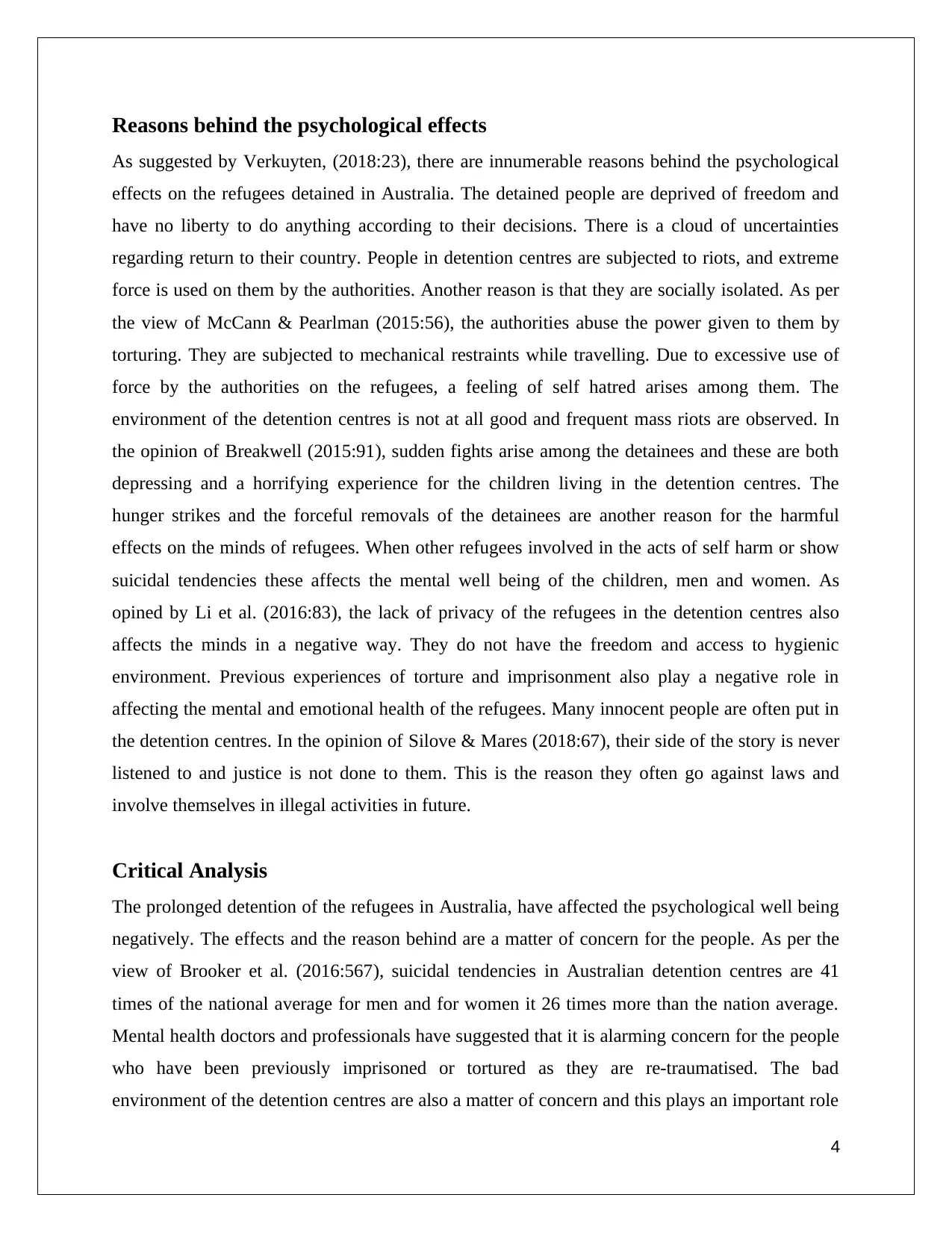
Reasons behind the psychological effects
As suggested by Verkuyten, (2018:23), there are innumerable reasons behind the psychological
effects on the refugees detained in Australia. The detained people are deprived of freedom and
have no liberty to do anything according to their decisions. There is a cloud of uncertainties
regarding return to their country. People in detention centres are subjected to riots, and extreme
force is used on them by the authorities. Another reason is that they are socially isolated. As per
the view of McCann & Pearlman (2015:56), the authorities abuse the power given to them by
torturing. They are subjected to mechanical restraints while travelling. Due to excessive use of
force by the authorities on the refugees, a feeling of self hatred arises among them. The
environment of the detention centres is not at all good and frequent mass riots are observed. In
the opinion of Breakwell (2015:91), sudden fights arise among the detainees and these are both
depressing and a horrifying experience for the children living in the detention centres. The
hunger strikes and the forceful removals of the detainees are another reason for the harmful
effects on the minds of refugees. When other refugees involved in the acts of self harm or show
suicidal tendencies these affects the mental well being of the children, men and women. As
opined by Li et al. (2016:83), the lack of privacy of the refugees in the detention centres also
affects the minds in a negative way. They do not have the freedom and access to hygienic
environment. Previous experiences of torture and imprisonment also play a negative role in
affecting the mental and emotional health of the refugees. Many innocent people are often put in
the detention centres. In the opinion of Silove & Mares (2018:67), their side of the story is never
listened to and justice is not done to them. This is the reason they often go against laws and
involve themselves in illegal activities in future.
Critical Analysis
The prolonged detention of the refugees in Australia, have affected the psychological well being
negatively. The effects and the reason behind are a matter of concern for the people. As per the
view of Brooker et al. (2016:567), suicidal tendencies in Australian detention centres are 41
times of the national average for men and for women it 26 times more than the nation average.
Mental health doctors and professionals have suggested that it is alarming concern for the people
who have been previously imprisoned or tortured as they are re-traumatised. The bad
environment of the detention centres are also a matter of concern and this plays an important role
4
As suggested by Verkuyten, (2018:23), there are innumerable reasons behind the psychological
effects on the refugees detained in Australia. The detained people are deprived of freedom and
have no liberty to do anything according to their decisions. There is a cloud of uncertainties
regarding return to their country. People in detention centres are subjected to riots, and extreme
force is used on them by the authorities. Another reason is that they are socially isolated. As per
the view of McCann & Pearlman (2015:56), the authorities abuse the power given to them by
torturing. They are subjected to mechanical restraints while travelling. Due to excessive use of
force by the authorities on the refugees, a feeling of self hatred arises among them. The
environment of the detention centres is not at all good and frequent mass riots are observed. In
the opinion of Breakwell (2015:91), sudden fights arise among the detainees and these are both
depressing and a horrifying experience for the children living in the detention centres. The
hunger strikes and the forceful removals of the detainees are another reason for the harmful
effects on the minds of refugees. When other refugees involved in the acts of self harm or show
suicidal tendencies these affects the mental well being of the children, men and women. As
opined by Li et al. (2016:83), the lack of privacy of the refugees in the detention centres also
affects the minds in a negative way. They do not have the freedom and access to hygienic
environment. Previous experiences of torture and imprisonment also play a negative role in
affecting the mental and emotional health of the refugees. Many innocent people are often put in
the detention centres. In the opinion of Silove & Mares (2018:67), their side of the story is never
listened to and justice is not done to them. This is the reason they often go against laws and
involve themselves in illegal activities in future.
Critical Analysis
The prolonged detention of the refugees in Australia, have affected the psychological well being
negatively. The effects and the reason behind are a matter of concern for the people. As per the
view of Brooker et al. (2016:567), suicidal tendencies in Australian detention centres are 41
times of the national average for men and for women it 26 times more than the nation average.
Mental health doctors and professionals have suggested that it is alarming concern for the people
who have been previously imprisoned or tortured as they are re-traumatised. The bad
environment of the detention centres are also a matter of concern and this plays an important role
4
Paraphrase This Document
Need a fresh take? Get an instant paraphrase of this document with our AI Paraphraser

in disturbing refugees’ peace of mind. As per the view of Puvimanasinghe et al. (2015:746),
detention policies and law of Australia in this regard falls short of providing justice to the
innocent people and children are also not forgiven. This is a matter of concern for the future of
the children and their development both mentally and physically is restrained.
Conclusion
The study focused on the psychological factors and the reasons behind the psychological effects
on the refugees detained Australia. The prolonged detention is the major cause behind this as the
mental stress increases with increase in time of detention. The law should be merciful for the
children and women as they are never involved directly in matters of unlawful or illegal breach.
It can thus be concluded that the psychological effects could be minimised with enough attention
required on the children of all age group.
5
detention policies and law of Australia in this regard falls short of providing justice to the
innocent people and children are also not forgiven. This is a matter of concern for the future of
the children and their development both mentally and physically is restrained.
Conclusion
The study focused on the psychological factors and the reasons behind the psychological effects
on the refugees detained Australia. The prolonged detention is the major cause behind this as the
mental stress increases with increase in time of detention. The law should be merciful for the
children and women as they are never involved directly in matters of unlawful or illegal breach.
It can thus be concluded that the psychological effects could be minimised with enough attention
required on the children of all age group.
5
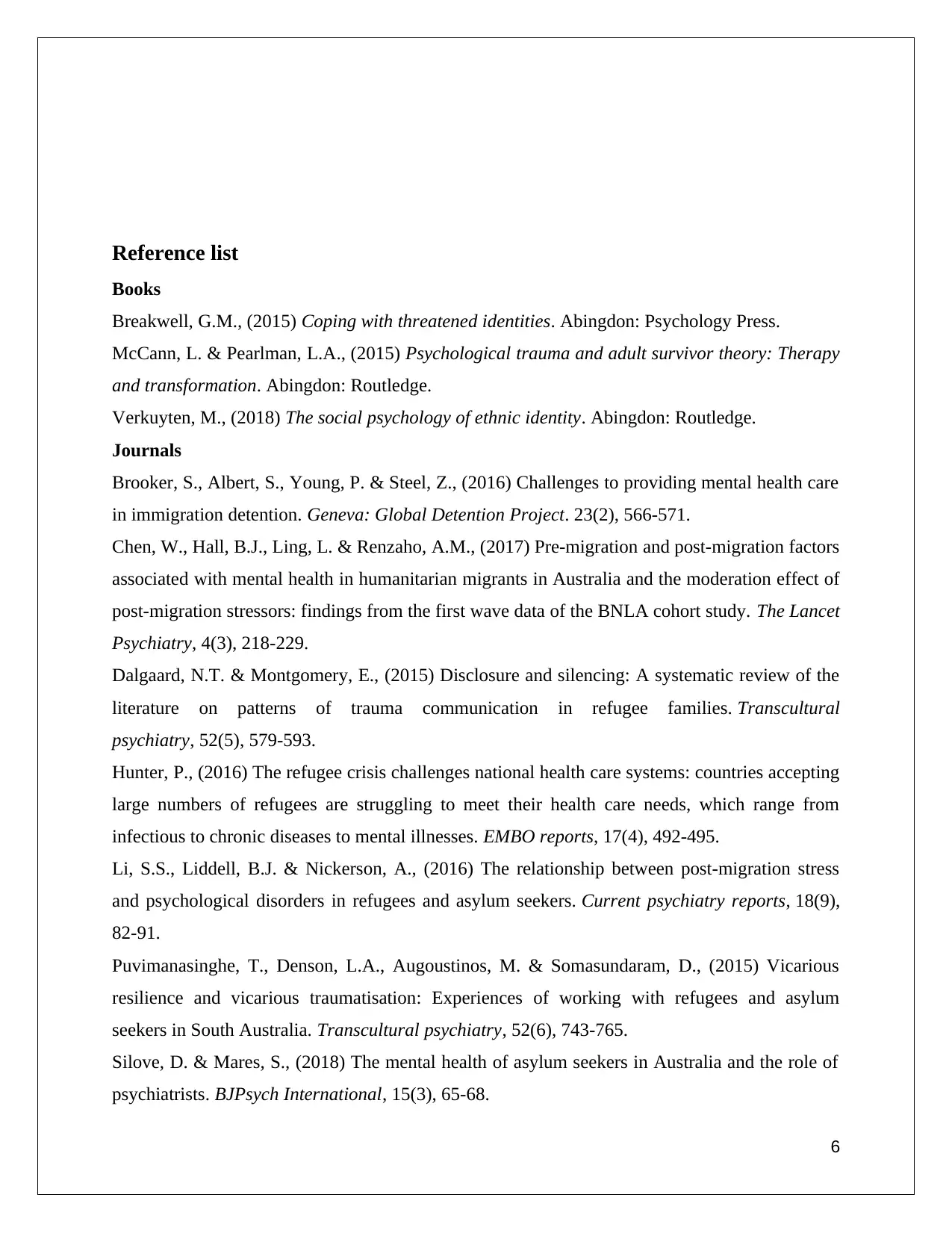
Reference list
Books
Breakwell, G.M., (2015) Coping with threatened identities. Abingdon: Psychology Press.
McCann, L. & Pearlman, L.A., (2015) Psychological trauma and adult survivor theory: Therapy
and transformation. Abingdon: Routledge.
Verkuyten, M., (2018) The social psychology of ethnic identity. Abingdon: Routledge.
Journals
Brooker, S., Albert, S., Young, P. & Steel, Z., (2016) Challenges to providing mental health care
in immigration detention. Geneva: Global Detention Project. 23(2), 566-571.
Chen, W., Hall, B.J., Ling, L. & Renzaho, A.M., (2017) Pre-migration and post-migration factors
associated with mental health in humanitarian migrants in Australia and the moderation effect of
post-migration stressors: findings from the first wave data of the BNLA cohort study. The Lancet
Psychiatry, 4(3), 218-229.
Dalgaard, N.T. & Montgomery, E., (2015) Disclosure and silencing: A systematic review of the
literature on patterns of trauma communication in refugee families. Transcultural
psychiatry, 52(5), 579-593.
Hunter, P., (2016) The refugee crisis challenges national health care systems: countries accepting
large numbers of refugees are struggling to meet their health care needs, which range from
infectious to chronic diseases to mental illnesses. EMBO reports, 17(4), 492-495.
Li, S.S., Liddell, B.J. & Nickerson, A., (2016) The relationship between post-migration stress
and psychological disorders in refugees and asylum seekers. Current psychiatry reports, 18(9),
82-91.
Puvimanasinghe, T., Denson, L.A., Augoustinos, M. & Somasundaram, D., (2015) Vicarious
resilience and vicarious traumatisation: Experiences of working with refugees and asylum
seekers in South Australia. Transcultural psychiatry, 52(6), 743-765.
Silove, D. & Mares, S., (2018) The mental health of asylum seekers in Australia and the role of
psychiatrists. BJPsych International, 15(3), 65-68.
6
Books
Breakwell, G.M., (2015) Coping with threatened identities. Abingdon: Psychology Press.
McCann, L. & Pearlman, L.A., (2015) Psychological trauma and adult survivor theory: Therapy
and transformation. Abingdon: Routledge.
Verkuyten, M., (2018) The social psychology of ethnic identity. Abingdon: Routledge.
Journals
Brooker, S., Albert, S., Young, P. & Steel, Z., (2016) Challenges to providing mental health care
in immigration detention. Geneva: Global Detention Project. 23(2), 566-571.
Chen, W., Hall, B.J., Ling, L. & Renzaho, A.M., (2017) Pre-migration and post-migration factors
associated with mental health in humanitarian migrants in Australia and the moderation effect of
post-migration stressors: findings from the first wave data of the BNLA cohort study. The Lancet
Psychiatry, 4(3), 218-229.
Dalgaard, N.T. & Montgomery, E., (2015) Disclosure and silencing: A systematic review of the
literature on patterns of trauma communication in refugee families. Transcultural
psychiatry, 52(5), 579-593.
Hunter, P., (2016) The refugee crisis challenges national health care systems: countries accepting
large numbers of refugees are struggling to meet their health care needs, which range from
infectious to chronic diseases to mental illnesses. EMBO reports, 17(4), 492-495.
Li, S.S., Liddell, B.J. & Nickerson, A., (2016) The relationship between post-migration stress
and psychological disorders in refugees and asylum seekers. Current psychiatry reports, 18(9),
82-91.
Puvimanasinghe, T., Denson, L.A., Augoustinos, M. & Somasundaram, D., (2015) Vicarious
resilience and vicarious traumatisation: Experiences of working with refugees and asylum
seekers in South Australia. Transcultural psychiatry, 52(6), 743-765.
Silove, D. & Mares, S., (2018) The mental health of asylum seekers in Australia and the role of
psychiatrists. BJPsych International, 15(3), 65-68.
6
⊘ This is a preview!⊘
Do you want full access?
Subscribe today to unlock all pages.

Trusted by 1+ million students worldwide
1 out of 6
Related Documents
Your All-in-One AI-Powered Toolkit for Academic Success.
+13062052269
info@desklib.com
Available 24*7 on WhatsApp / Email
![[object Object]](/_next/static/media/star-bottom.7253800d.svg)
Unlock your academic potential
Copyright © 2020–2026 A2Z Services. All Rights Reserved. Developed and managed by ZUCOL.





